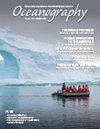PMEL对通过持续重复水文观测和分析年代际全球海洋变化的贡献
IF 2.8
4区 地球科学
Q1 OCEANOGRAPHY
引用次数: 0
摘要
海洋正在变暖,酸化,并失去氧气。全球海洋船舶水文调查计划(GO-SHIP)沿着所有海洋盆地的指定样带进行重复水文调查,以便准确和精确地量化温度、盐度、碳、氧、营养物质、速度和人为示踪剂等变量的变化,并利用这些观测结果了解通风模式、脱氧、热吸收、海洋碳含量和环流变化。GO-SHIP为模型验证和校准自动传感器(包括Argo)提供全球、全深度、黄金标准的数据。太平洋海洋环境实验室在美国国家海洋和大气管理局的持续资助下,已经开发出了测量GO-SHIP常规采样的几个变量的方法,并且是这些重复水文巡航的核心贡献者。本文章由计算机程序翻译,如有差异,请以英文原文为准。
PMEL’s Contribution to Observing and Analyzing Decadal Global Ocean Changes Through Sustained Repeat Hydrography
The ocean is warming, acidifying, and losing oxygen. The Global Ocean Ship-based Hydrographic Investigations Program (GO-SHIP) carries out repeat hydrographic surveys along specified transects throughout all ocean basins to allow accurate and precise quantification of changes in variables such as temperature, salinity, carbon, oxygen, nutrients, velocity, and anthropogenic tracers, and uses these observations to understand ventilation patterns, deoxygenation, heat uptake, ocean carbon content, and changes in circulation. GO-SHIP provides global, full-depth, gold-standard data for model validation and calibration of autonomous sensors, including Argo. The Pacific Marine Environmental Laboratory, through sustained funding from NOAA, has developed methods to measure several of the variables routinely sampled through GO-SHIP and is a core contributor to these repeat hydrographic cruises.
求助全文
通过发布文献求助,成功后即可免费获取论文全文。
去求助
来源期刊

Oceanography
地学-海洋学
CiteScore
6.10
自引率
3.60%
发文量
39
审稿时长
6-12 weeks
期刊介绍:
First published in July 1988, Oceanography is the official magazine of The Oceanography Society. It contains peer-reviewed articles that chronicle all aspects of ocean science and its applications. In addition, Oceanography solicits and publishes news and information, meeting reports, hands-on laboratory exercises, career profiles, book reviews, and shorter, editor-reviewed articles that address public policy and education and how they are affected by science and technology. We encourage submission of short papers to the Breaking Waves section that describe novel approaches to multidisciplinary problems in ocean science.
 求助内容:
求助内容: 应助结果提醒方式:
应助结果提醒方式:


